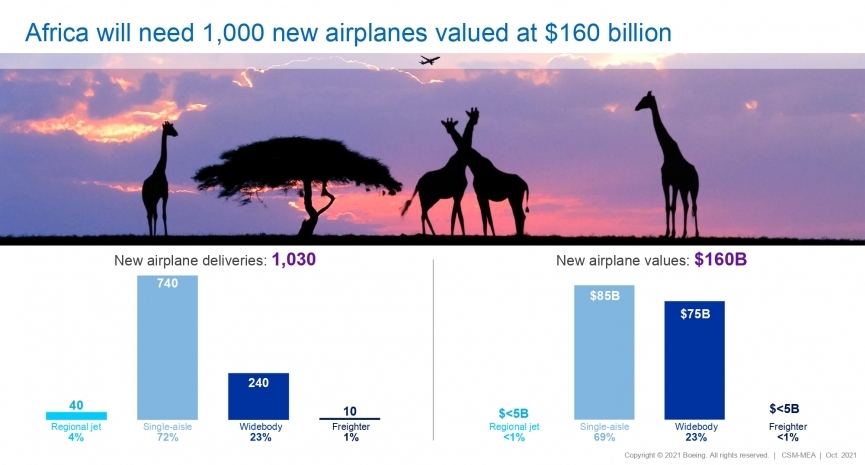African airlines require 1,030 new aircraft by 2040 valued at $160B: Boeing
Boeing forecasts that Africa’s airlines will require 1,030 new airplanes by 2040 valued at $160 billion and aftermarket services such as manufacturing and repair worth $235 billion.

October 21, 2021: Boeing forecasts that Africa’s airlines will require 1,030 new airplanes by 2040 valued at $160 billion and aftermarket services such as manufacturing and repair worth $235 billion.
Boeing shared the projection as part of the 2021 Commercial Market Outlook (CMO), the company’s long-term assessment of demand for commercial airplanes and services.
“Africa’s strong, long-term growth prospects for commercial aviation are closely tied to the continent’s projected 3 percent annual economic growth over the next 20 years. Initiatives such as the African Continental Free Trade Area and Single African Air Transport Market are expected to stimulate trade, air travel and economic cooperation. Additionally, the region’s middle class and working population are projected to double by the end of the forecast period, driving increased demand for air travel,” according to the Boeing release.
Randy Heisey, Boeing managing director of Commercial Marketing for the Middle East and Africa, said, “African carriers are well-positioned to support inter-regional traffic growth and capture market share by offering services that efficiently connect passengers and enable commerce within the continent.”
The 2021 Africa CMO also includes these projections through 2040:
• Airlines in Africa will grow their fleets by 3.6 pecent per year to accommodate passenger traffic growth of 5.4 percent annually, the third-highest growth rate in the world.
• Single-aisle jets are expected to account for more than 70 percent of commercial deliveries, with 740 new planes mainly supporting domestic and inter-regional demand. In addition, African carriers are estimated to need 250 new widebodies, including passenger and cargo models, to support long-haul routes and air freight growth.
• 80% of African jet deliveries are expected to serve fleet growth with more sustainable, fuel-efficient models such as the 737, 777X and 787 Dreamliner, with 20 percent of deliveries replacing older airplanes.
• Estimated demand for aviation personnel will rise to 63,000 new professionals, including 19,000 pilots, 20,000 technicians and 24,000 cabin crew members.
• Commercial services opportunities such as supply chain, manufacturing, repair and overhaul are valued at $235 billion.


